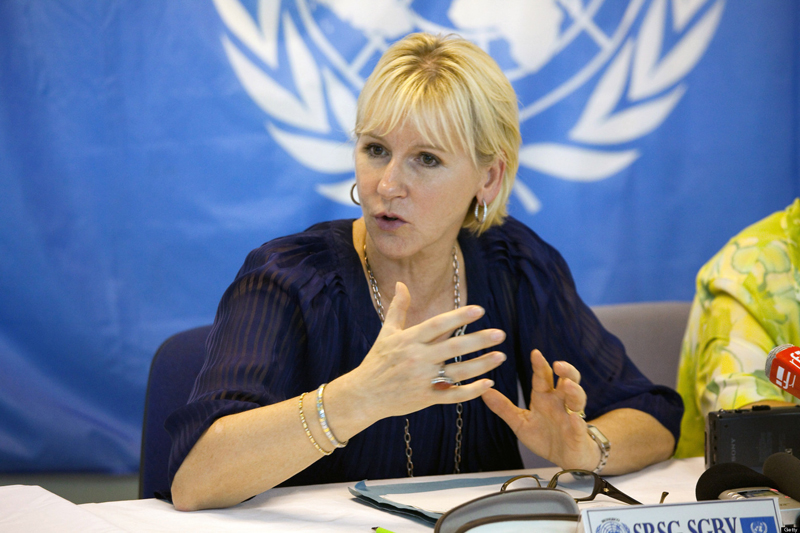A State of the World’s Children Report notes that nearly 80 per cent of the 53 million people uprooted by wars are women and children. Human Rights Watch has noted that rape, sexual slavery and forced marriage are common occurrences in conflict zones. Rape is often used as a ‘tactic of war’ during armed conflict. The patriarchal gender system followed in many counties of the world is characterized by male domination, son preference, and restrictive codes for women, early marriage and family honour made incumbent on women’s virtue.


In the Indian society, there is such extreme control over women’s lives and bodies that there was a barrage of sexist public commentary by politicians and clerics after the 2013 Delhi Gang rape, blaming the victim. Kavita Krishnan, AIPWA secretary stated as a response to these comments, “We will be reckless, we will be rash. Don’t tell us how to dress. Don’t tell us when and where to go out.” The civil society movement for women’s freedom to choice and movement in Delhi made the international community sit up and take notice.
Whether its wartime violence on women systematically denying them their rights or patriarchal gender systems restricting women’s freedoms, foreign policy objectives the world over have taken very little or no account of it. While discussing sexual violence, Anne Marie Goetz of UN Women said that it was, “an even more destructive weapon than landmines or cluster bombs on communities because its effects are so long term”. Yet the issue has always managed to escape the attention of strategists and foreign policy experts.
Conference room discussions on foreign policy seem to be comprising of hawks who negotiate over the hard power issues of war, weapons, aid and trade. While gender rights are left as a topic of discussion for the do-gooders of the civil society. While feminism prescribes prioritization of the universal rights of women, foreign policy is the realm of steadfast pursuit of national interest. Foreign policy is seemingly a place of hard-boiled discussion and diplomacy, the skill of using a carefully crafted language to further the home country’s policy interests.
A feminist foreign policy is a tenuous ground, because it requires balancing the national interest, with the universal right to gendered equality. It requires a delicate balance of valuing women’s rights and lives along with national interest. Sweden’s became the world’s first to boast of a feminist foreign policy after foreign minister Margot Wallstrom, was appointed the Sweden’s foreign minister in October 2014. Immediately after taking office, Wallstrom commented on the discriminatory treatment meted out by Saudi regime to its dissidents and women.
Although Wallstrom is not the first to shed a feminist perspective on foreign policy. In 2009 Hillary Rodham Clinton, the US Secretary of the State, visited the Democratic Republic of the Congo and talked to rape victims, and was instrumental in the passage of a series of UN security council resolutions. But, Wallstrom’s policy has resulted in a rap on the knuckles by the Arab league who blocked her from delivering a speech in Cairo. Considering that Saudi Arabia is one of the biggest buyers of Sweden’s arms export, Wallstrom’s comments have caused ripples.
A feminist foreign policy would imply, a gendered perspective on aid, development and security. But even the most basic attempt at implementing a feminist foreign policy is termed as external interference by regimes that wish to continue in patriarchal gender systems. The North African and West Asian countries demonstrate some of the worst forms of gendered violence and discrimination. But given their geo-political strategic ties with countries in terms of trade and military, the regimes haven’t invited criticism by world leaders.
The state of women is so poor that even adult Saudi Arabian women are required to be accompanied by a male guardian. The male guardian or the mahram is responsible for granting permission for medical procedures, travel and conducting official business. These restrictions are nothing short of a throw-back to the dark ages. The Shoura council of the Saudi Arabian King, which is the formal advisory body of the monarch advised that the women should wear modest clothes and limit the amount of interaction with men they were unrelated to. Activites like sports, swimming and changing in a public dressing room are also restricted for women.
World leaders have chosen to be silent about a whole host of disadvantages faced by the muslim women under the patriarchal gender system in countries such as Saudi Arabia. In criticizing the regime, Wallstrom has not only attracted the ire of Saudi Arabian leadership, but the discontent of conservative leaders across the world. Sweden has made a brave attempt at addressing the elephant in the conference room and it’s high time that high-tea meetings acknowledge and adopt a feminist foreign policy.
Donation for Centre for Social Research to Join our effort in rehabilitating Domestic Violence
Discuss this article on Facebook




